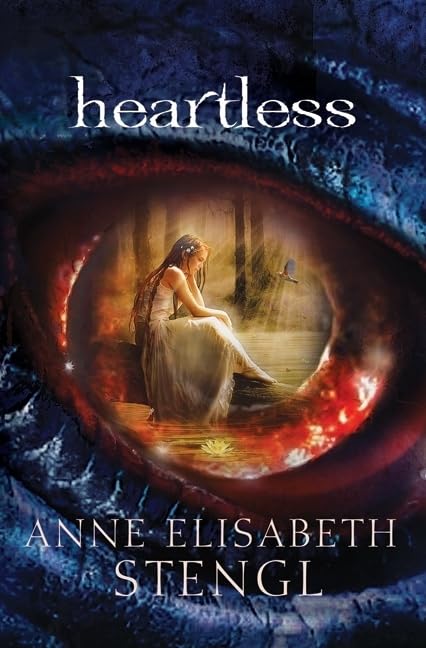
Heartless
The dragon king seeks his princess. Who dares to stop him?
Princess Una of Parumvir has come of age and will soon marry. She dreams of a charming prince, but when her first suitor arrives, he’s not what she’d hoped. Prince Aethelbald of mysterious Farthestshore has traveled a great distance to prove his love—and also to bring hushed warnings of danger. A dragon is rumored to be on the hunt and blazing a path of terror.
Una, smitten instead with a more dashing prince, refuses Aethelbald’s offer—and ignores his cautions with dire consequences. Soon the Dragon King himself is in Parumvir and Una, in giving her heart away unwisely, finds herself in his sights. Only those courageous enough to risk everything have a hope of fighting off this advancing evil.
Book 1 of the Tales of Goldstone Wood series
Review of Anne Elisabeth Stengl’s Heartless
Princess Una has finally come of age. She eagerly waits for a prince to come and pay his respects to her father and ask for her hand. However, she is disappointed by the arriving princes who fail to win her heart, especially Aethelbald, prince of Farthestshore. He is so boring, even as he warns of a dangerous dragon lurking in the land. Anne Elisabeth Stengl’s Heartless (2010) takes the form of a fairy tale while creating a completely new story to delight and inspire. Lyrical prose composes a stirring tale of adventure and romance, with clear inspiration from Scripture as well as the best themes of Grimm’s fairy tales, Andrew Yang, and George MacDonald.
Best for: Teen and adult fans of fairy tales, biblical allegory, or romantic fantasy.
Discern: Brief descriptions of violence from war and dragon attacks, people transformed into monsters.






































The summary does not do this book justice. I picked it up, expecting, well, mediocrity. What I got was a fast-paced, well-written flight of fantasy. From the beginning, with the entrance of the Twelve-Year Market, all the way to Una’s mismatched suitors and the encroaching dragon. It’s a great read.
Also, I didn’t expect, uh, well, that’d be a spoiler. Let’s just say that the Dragon wins for a while. And the Dragon is BAD. He’s like Voldemort, only a dragon. Wheeling, dealing, and annihilating people. By the end I was rooting for Aethelbald or somebody to kill this dude.
Aethelbald, the Faerie prince who looks so dreadfully ordinary, is the butt of lots of jokes but nonetheless remains a gentleman. Una can’t stand him because he’s “not romantic”, but it’s precisely this that makes him awesome.
I could go on and on. All the characters are well-defined and memorable. I wish I had the space to gush about every one of them. I can’t wait to read more of Stengl’s books and follow the further adventures of the other characters.
Like Kessie, I was expecting the same thing. But Heartless was anything but! I loved this book. What I loved the most was how Aethelbald loved Una, despite her selfishness and despite how ugly she became in the end. The book was a great picture of God’s steadfast love for us.
Heartless, by Anne Elisabeth Stengl
Heartless, by Anne Elisabeth Stengl, is a fantasy book, with swords, magic, and dragons. (See here for my musings on why sword and sorcery fiction is popular). It won the Christy award for Best First Novel in 2011. I haven’t read the others, and I’m not sure if a fantasy novel has won this particular Christy Award previously, but the award was well deserved.
Stengl does not have a Wikipedia article on her, and Heartless doesn’t, either. Here is the Amazon page for the author, and she has a blog.
I’ll try to give away as little as possible of the plot, but will muse on various aspects of the novel. The plot is complex.
First, I confess that I have read two novels, by the same author, published after Heartless. The second one, Veiled Rose, mostly takes place before the events in Heartless. There are some allusions to these events in Heartless, indicating that the author didn’t just write a second novel based on the first one — the first one foreshadows the second, and she already had largely it in mind when writing the first.
Second, there is no doubt in my mind that this qualifies as a Christian novel, by almost any standard. I don’t say this because it mentions Christ, or God, or the Bible, or salvation. It doesn’t. In fact, the theology of the characters is nearly non-existent. They don’t worship together, and they don’t pray on a regular basis. I hope to post later, giving more detail on why I say that the book is Christian. My guess is that the fact that there is no direct “preaching” in the book might make it more attractive to non-Christians.
There is a Christ-figure, not in the sense that he dies to pay for the sins of others, at least not within the events of this book, but in the sense that he comes from another realm — fairyland, with the purpose of taking a bride for himself.
There are, as I said, dragons. Stengl’s dragons live a very long time. They can appear as dragons, huge lizards with wings and fiery breath, or as human, or at least human-like, beings. They can talk, and are intelligent. They love treasure. They are almost entirely evil. No dragon is a main character, but a few of them appear in the book, and they are important in it.
The theme of the book is trust. Una, a princess coming into adulthood, and one of the main characters, trusts the wrong person for much of the story, but finally comes to trust the right one. In fact, she trusts him enough to let him kill her, as a dragon, so that she may live as a human. The episode reminded me of the experience of Eustace, transformed from a dragon to a human by Aslan, in The Voyage of the Dawn Treader, by C. S. Lewis, but Stengl’s depiction is more gripping, and, as I said, coming to that point is, in large part, what the book is about.
This is a fine book, and compares well with good fantasy by mainstream authors. I confess that I have read Heartless twice in less than two months, and I am glad that I did.
I have read both the hardback book and the Kindle edition. Bethany House, the publisher, is to be commended for the latter. Not only are there color ornaments, and the like, and not many typos, but you can go to page numbers in the book, if you need to.
The book could have used a map, but there isn’t one, in either edition.
Thanks for reading. Read Heartless.
This is copied from my blog post on this date.
Thanks for this opportunity.